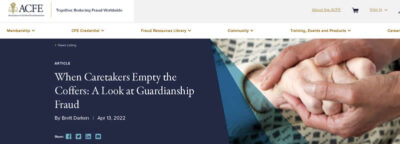ACFE When Caretakers Empty the Coffers: A Look at Guardianship Fraud By Brett Darken

In nearly every state, guardians are considered fiduciaries. As such, they have a duty to act in their clients’ best financial interests. Sadly, that’s not always the case Anti-fraud professionals know that fraudsters often target victims when they’re most vulnerable. When people are processing strong emotions — like dealing with the mental or physical decline of a family member — it’s easy to ignore red flags that something’s amiss. During these times courts may appoint a guardian with the idea that an impartial third-party is better equipped to handle the financial responsibilities involved with taking care of an incapacitated individual. Unfortunately, in some cases, this can open the door for fraudsters to commit fiduciary fraud. Guardianships Guardianship can be ordered by a judge when they determine that a person is unable care for their own affairs. The judge orders an independent guardian, or conservator, to oversee and look out for the well-being of the person who can’t care for themselves. Guardianships frequently involve the elderly, or adults who have some form of dementia or mental incapacitation, but as demonstrated in the recent Brittany Spears case that garnered worldwide media attention, a ruling for guardianship can be made for people of any age. In nearly every state, guardians are considered fiduciaries. As such, they have a duty to act in their clients’ best financial interests. Sadly, that’s not always the case. In 2017, a federal jury awarded $16.4 million to Julian Bivins who sued two West Palm Beach attorneys, among others, for breaching their fiduciary duties. Bivins’ suit alleged that his father was “held captive” by the guardianship so the attorneys could liquidate real estate assets. A RICO Case in Ohio One guardianship battle in Ohio that has been ongoing for… Read More



